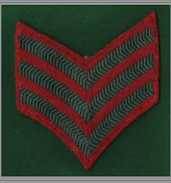I was told about the QARANC: full pay as a Private; no costs; world travel; paid holiday trips back to Scotland; a paid trip back to Canada every 2 years; army officer in 4 years. Who could resist? I signed up. 13 of us travelled from Aldershot to the Queen Alexandra Military Hospital in London, located around the corner from the Tate. In addition to functioning as a military hospital, it also specialized in providing medical and nursing care for British soldiers and (women) spouses worldwide, who required the cancer treatments offered in London civilian hospitals. As such, we were learned of rare forms of cancer and their treatments.
There were intakes of new SRN (State Registered Nurse) students every 3 months; the hospital was primarily staffed by these students, with a nursing sister and a staff nurse on each ward. After 6 weeks of basic training, we were fully integrated into the wards. The training & experience were excellent; every student nurse senior to you was responsible for your performance, and there wasn’t a chance that they were going to be disciplined because of your error! Over nights we worked 14 x 12 hour shifts in a row, with 7 days off following. After 6 months, I was ‘night special’ for the entire hospital and not concerned or afraid. That is how good the training was. You might conclude – she must have completed it! The answer is that I did not; I will get back to that.
All of the single student nurses lived in sex segregated barracks. We 13 lived in a large old Victorian house in Pimlico, where we shared bedrooms. The house was staffed by a civilian housekeeper, with a WRAC Sergeant whose job it was (on her off time from work) to maintain military order, which included the exertion of control over aspects of our personal lives. As such, there was no love lost between us and the Sergeant; I will also get back to that.
What was it like to be a 19 year old Scottish/Canadian student nurse in the QA’s in the early 1970’s? I was most certainly a product of my times both as a young woman socialized in the 1950/60’s, and my dual experience as a Scot and a Canadian. How did it show itself? In two ways: one specific to my dual upbringing, and one common to young women of that era.
First off, apparently from the perspective of the army nursing instructor, I was a “a big mouth from the colonies” who did not know her place whatsoever. Then again, perhaps my reaction to learning that the QA student nurses had a curfew while the RAMC student nurses did not, had something to do with her opinion? When I brazenly expressed my disbelief and shock, the Major responded “Well Lynn, when British parents send their daughters to the QARANC, they expect them to be kept safe”. My 19 years old colonial self responded, “Then they should keep them at home!”. This was not deemed to be an acceptable response from a Private to a Major, and it set myself and the Major on a rocky interpersonal road. Nonetheless, she was a consummate professional, and our ongoing interpersonal dynamic did not impact my training, nor her positive reviews of my nursing practice.
Second, I was most definitely a product of the times, which for girls and women meant a pink collar ‘service to others’ job, with the requisite laser focus on romance and then marriage, as the GOAL. How did this show itself within my QA experience? We started out as 13 students, with only 2 going on to graduate as SRN’s. The rest fell victim to the times.
In addition to a daily 11pm curfew, a key part of the army’s attempt to keep us ‘vulnerable young things safe', while maintaining both military order & socially prescribed decorum and control, was that male guests were strictly forbidden from entering the house. But…and you might guess it….it wasn’t unusual for male guests to visit us…. overnight…. and in our shared bedrooms to boot! As well, the Sergeant’s overnight guests were not infrequently found wandering the hallway in search of the loo. This was to be her downfall.

Here’s what happened. The first of us fell prey to the lure of marriage; this required a celebration; off we all went to a pub, trooping in at 11:20, to be met by an extremely irate Sergeant who lorded it over us and threatened us with a charge. Up we went in front of Matron, with revenge in our collective mind. Side stepping the issue of being late for curfew, we quivered in our boots, crocodile tears running down our faces as we relayed how terrified we all were, with Sergeant’s men friends frequently wandering the halls of the house during the night! Matron, steely eyed, demanded to know why we had not spoken of this previously!!! We vulnerable young things stammered that ‘we were just too afraid’.
Within the week, the Sergeant silently and unexpectedly departed for Germany. No charges followed for the QA student nurses.
For myself, I too soon fell prey to my 1950/60’s socialization, married an RAMC student nurse, and as was allowed only for women at the time of marriage, chose to leave – one of life’s BIG regrets! In 1976 when my then husband was able to leave the army, we emigrated to Vancouver.






No comments:
Post a Comment